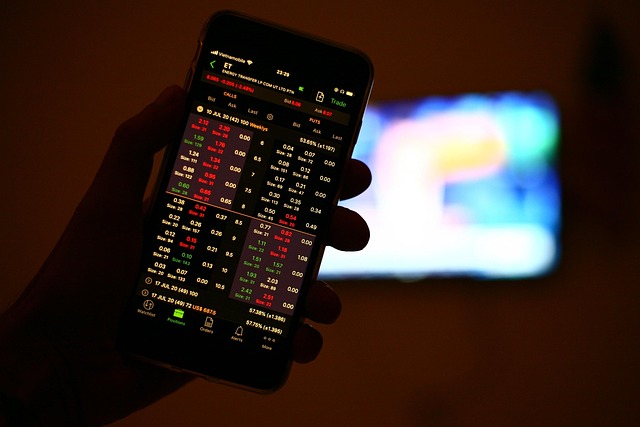Binomo Trading App Is Real or Fake — Honest Review, Risks and Verification
Author: Jameson Richman Expert
Published On: 2025-11-03
Prepared by Jameson Richman and our team of experts with over a decade of experience in cryptocurrency and digital asset analysis. Learn more about us.
Binomo trading app is real or fake? In this comprehensive guide you’ll find a clear, step-by-step examination of Binomo’s platform, legal and regulatory status, common user complaints, practical verification checks, and safer alternatives. Whether you’re a beginner wondering if Binomo is legitimate or an experienced trader evaluating risk, this article gives evidence-based analysis, actionable testing steps, and trusted resources so you can decide for yourself.

Executive summary
Short answer: Binomo exists as an online trading platform, but "real" does not automatically mean "safe" or "suitable" for everyone. The platform has a live product and active user base, yet its regulatory coverage, business practices, and user experiences vary by region. Many jurisdictions restrict or ban binary-option style trading, and some customers report problems with withdrawals and customer service. Use the verification checklist below, start with a demo and small tests, and prefer fully regulated alternatives if you want stronger consumer protection.
What is Binomo? A quick overview
Binomo is an online trading platform that offers short-term financial contracts and a mobile trading app. The interface typically provides charting, simple option-like trades, and promotional materials promising quick returns. Historically, platforms like Binomo are often associated with "binary options" or fixed-return trading products. For background on how binary options work and why they are controversial, see the Wikipedia entry on binary options (Binary option — Wikipedia) and Investopedia’s definition (What Is a Binary Option? — Investopedia).
Binomo trading app is real or fake — detailed assessment
Answering whether the "Binomo trading app is real or fake" requires separating three questions:
- Is the platform functional (does it run trades and accept users)? — Yes, the app and website operate and accept deposits in many countries.
- Is it legally registered and regulated? — That depends on jurisdiction. Many online trading apps operate from offshore jurisdictions and may not hold a license from primary financial regulators in your country.
- Is the platform trustworthy and safe for retail clients? — This varies: some users report smooth experiences, others report difficulties with withdrawing funds or aggressive marketing. The mixed reviews mean you should perform due diligence before depositing significant funds.

Regulation and legal status: What to check
Regulation is the strongest single indicator of consumer protection. Follow these practical steps:
- Check the company registration and legal entity name on the platform’s "About" or "Legal" page.
- Search for the company on major regulator websites (for example, the U.S. SEC or CFTC, the UK FCA, Australia’s ASIC). Many countries prohibit unlicensed firms from offering binary options to retail clients.
- Confirm whether the platform lists a license number and verify that number on the regulator’s site.
Useful regulator resources:
- UK Financial Conduct Authority (FCA): fca.org.uk
- U.S. Commodity Futures Trading Commission (CFTC) education and alerts: CFTC Consumer Protection
- Investopedia and Wikipedia background on high-risk instruments: Binary options overview
Common red flags and warning signs
When evaluating any trading app, watch for these red flags:
- No strong regulation — Offshore registration without oversight by a reputable regulator.
- Unclear ownership or contact information — No verifiable corporate address, PO boxes only, or no phone numbers.
- Withdrawal problems — Delays, excessive verification requests, or sudden account freezes linked to withdrawal attempts.
- Aggressive marketing — Promises of guaranteed profits, high-pressure invitations, or celebrity endorsement claims that don’t check out.
- Hidden fees and complex terms — Penalties for inactivity, withdrawal fees not disclosed up front, or fine-print clauses blocking exits.
- Fake reviews and social proof — Overly positive comments with similar phrasing or paid influencer promotions without disclosures.
How to verify a trading app yourself — step-by-step checklist
Before depositing more than a small amount, walk through these checks:
- Verify domain & HTTPS: Look for the padlock and confirm the domain matches the company name. Use WHOIS lookups to see registration dates.
- Confirm legal info: Find the corporate name, registered address, and licensing claims. Try to validate the license with the regulator.
- Read the terms and conditions: Pay attention to withdrawal terms, fees, dispute resolution, and arbitration clauses.
- Open a demo account: Most legitimate platforms offer a demo. Use it to learn the UI and test execution.
- Small deposit test: Deposit a small amount and then request a withdrawal to test the process end-to-end.
- Check customer support: Test response time and quality using email, chat, and phone (if available).
- Search for complaints: Use Google, Trustpilot, Reddit, and local consumer protection sites to read real user experiences.
- Evaluate KYC/AML: Legitimate platforms use Know Your Customer (KYC) checks. Unlicensed sites may avoid thorough identity checks.

Real user experiences: what people report
Online reviews for many short-term trading platforms show a polarization: traders who made early gains and withdrew successfully give positive feedback; others report blocked withdrawals or difficulty getting support. Common complaint patterns include:
- Accounts suddenly classified as VIP or managed accounts and pressured into larger deposits.
- Complex verification requests after large trades (e.g., extensive ID documentation, bank statements) which can be normal, but in some reports are used as stalling tactics.
- Confusion over bonuses and terms — bonuses that lock funds or require high turnover before withdrawal.
Because reviews are mixed, use the small-deposit withdrawal test to experience the platform’s behavior directly before committing more.
How Binomo compares to regulated crypto/derivatives exchanges
If you’re weighing Binomo against crypto exchanges or derivatives platforms, you’ll find meaningful differences in product, regulation, and user protections. Regulated exchanges typically offer order books, margin trading, and derivatives with clearer regulatory oversight. If you prefer regulated markets, consider established exchanges such as:
- Register on Binance (referral) — one of the largest regulated crypto exchanges providing spot and derivatives trading.
- Sign up on MEXC (invite link) — an exchange offering spot, futures, and margin products.
- Bitget referral registration — derivatives and copy-trading platform that frequently runs trading challenges (strategy resources: Bitget trading challenge strategies guide).
- Bybit invite link — derivatives-focused exchange with a major global user base.
These exchanges typically operate under clearer regulatory frameworks and provide stronger liquidity than fixed-return apps. If you trade crypto futures or want to understand derivatives more, read a guide on crypto futures for 2025 and beyond here: Crypto futures trading meaning and insights for 2025.
Practical example: performing a safe verification test
Example workflow to test any trading app, including Binomo:
- Create an account using accurate personal details.
- Use the demo to verify interface behavior and simulate trades.
- Deposit a small amount (e.g., the minimum deposit) using a traceable payment method like a debit card or bank transfer.
- Place trades and then request a withdrawal equal to or less than your deposit to test processing times and required documents.
- If the withdrawal succeeds within the stated time and support is responsive, you’ve passed the basic test. If there are delays, escalate with documentation and, if necessary, contact your bank or payment provider for a chargeback.

How bonuses and promotions can trap users
Be cautious about bonuses. Many platforms offer matching bonuses or deposits for new accounts, but these often come with conditions — for example, a very high minimum trading volume before funds (or profits from bonuses) are withdrawable. Always read the bonus terms. If a bonus requires potentially thousands of trades to meet the requirement, that is a red flag for potential lock-in tactics.
Dispute resolution and consumer protections
If you face a dispute with a trading app, options depend on the platform’s legal location and whether it is a member of an independent dispute resolution body. Steps to take:
- Collect all evidence: screenshots, transaction IDs, email/chat transcripts.
- Contact the platform’s support and request an escalation.
- Check if the platform belongs to an independent commission (some brokers join organizations like the Financial Commission). Verify membership claims with the organization directly.
- If the platform is registered in a jurisdiction with consumer protection agencies, file a complaint.
- If payment was by card, contact your card issuer to discuss chargeback options.
Related reading and tools
Helpful resources to broaden your understanding and evaluate risks:
- Binary options background — Wikipedia: Binary option.
- Investment education and fraud prevention — Investopedia.
- Learn about particular crypto assets and market outlooks (example: XRP): XRP price today — predictions and outlook.
- Conversion and measurement guides (useful when calculating trade volumes or position sizing manually): How to calculate volume in liters from cm — step-by-step.
- Strategy and challenge resources for regulated derivatives trading (Bitget): Bitget trading challenge strategies guide.

Safer alternatives and when to use them
If you value regulation and strong consumer protections, consider shifting to regulated brokers or major crypto exchanges listed above. Each alternative has tradeoffs: centralized exchanges provide liquidity and regulated entities; over-the-counter or broker platforms may offer simplicity but lower protections.
When to choose a regulated exchange instead of an app like Binomo:
- You need transparent order books and standard trading instruments (spot, margin, futures).
- You prioritize strong compliance, KYC, and dispute resolution mechanisms.
- You plan to trade larger sizes or use leverage under clear rules.
Practical tips for safer online trading
- Never deposit more than you can afford to lose. High-return offers usually involve high risk.
- Keep records of every transaction and correspondence.
- Use strong, unique passwords and enable two-factor authentication (2FA).
- Prefer bank transfers or cards for deposits; they offer traceability and sometimes chargeback options.
- Check account statements and reconciliation frequently to spot errors or unauthorized activity early.
FAQ — Quick answers about "Binomo trading app is real or fake"
Q: Is Binomo a scam?
A: Labeling any platform a "scam" requires legal findings. Binomo is an operational trading platform, but it has mixed reviews and operates in a sector known for scams. The right approach is to verify licensing in your country, test withdrawals with small deposits, and evaluate terms before committing.
Q: Can I withdraw earnings easily?
A: Some users report smooth withdrawals, others report delays. Always test with a small withdrawal first and review withdrawal terms and fees in the T&Cs.
Q: Are there regulated alternatives?
A: Yes. For crypto and derivatives, consider exchanges like Binance (register on Binance), MEXC (MEXC invite), Bitget (Bitget referral) or Bybit (Bybit), depending on the services and regulatory reach you need.

Conclusion — final verdict and next steps
To answer "Binomo trading app is real or fake": the platform is real in the sense it operates and accepts users, but reality alone doesn’t equal trustworthiness. Because of the product type, limited regulatory coverage in many regions, and a mixed record of user experiences, approach with caution. Verify licensing, read terms, test withdrawals with small amounts, and prefer regulated exchanges if you require stronger legal protections.
Next steps:
- Follow the verification checklist in this article before depositing significant funds.
- If you plan to trade crypto derivatives or want a regulated environment, consider the exchanges linked above and read strategy resources such as the Bitget trading guide and crypto futures overview (Bitget strategies, Crypto futures guide).
- Keep learning: read objective educational sources like Investopedia and regulator advice pages to understand the risks before committing capital.
Disclaimer: This article provides informational content only and is not financial or legal advice. Always consult a licensed financial professional and your local regulator if you are uncertain about the legality or safety of a trading platform in your jurisdiction.